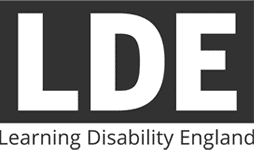Changing Our Lives uses principled, evidence-based research to challenge inequality.
Working in partnership with universities, we have taken our Quality of Life approach and embedded it into research projects that focus on policies and practices that impact the lives of people with learning disabilities and autistic people.
Minority Interest
Changing Our Lives is working with Manchester Metropolitan University’s Centre for Disability Research and the National Development Team for Inclusion between Nov 2024 – Aug 2027 on a research study. This study will explore what cultural competency means to people, how culturally competent the support they receive is and how confident support staff, providers and commissioners feel in delivering this support. This work is funded by the National Institute for Health and Care Research.

Supported living and residential care services constitute 62% of all social care expenditure on adults with a learning disability in England. The number of people with a learning disability from minority ethnic communities living in these services is not recorded. Sparse social care evidence mirrors the growing healthcare evidence base in reporting consistent inequalities and poor experiences of services among people with a learning disability from these communities.
In 2023, Small Margins highlighted the importance of intersectionality in how people with a learning disability want to be supported, which was rarely experienced in practice. Minority Interest will build on this by producing evidence-based resources to improve the cultural competency of supported living and residential care services supporting people with a learning disability from minority ethnic communities.

Minority Interest will:
- Explore what cultural competency means to people with a learning disability and support staff and how this impacts on their support
- Identify key barriers/success factors in the delivery of culturally competent services, and collate examples of culturally competent service support
- Examine how the intersection of ethnicity and disability impacts on people’s lives and either shapes, or is ignored by, people’s support

This research includes:
- 40 Quality Checks with adults with a learning disability and their families from South Asian, Black African, Black Caribbean and mixed heritage communities living in supported living or residential care across at least 6 provider organisations
- Workshops with groups of people with a learning disability and managers and staff from the participating provider organisations
- Workshops with 3 local authorities that commission social care and interviews with equality, diversity and inclusion (EDI) leads
As a result of this work, we will use the findings from the quality checks and what people have told us in the research, to develop and deliver action learning training to staff in providers. This training will focus on cultural competency and how they can use this knowledge to better support the individuals they work with.
Information regarding learning disability and autism in Urdu:
- What is a learning disability? (سیکھنے کی معذوری کیا ہے؟)
- What is autism? (آٹزم [خُوش خَيالی] کیا ہے؟)
Information regarding learning disability and autism in Punjabi:
Why are we stuck in hospital?
Changing Our Lives worked with the University of Birmingham on a two year research study (funded by the National Institute for Health and Care Research) to investigate why people with learning disabilities and autistic people spend so long in hospital.


As part of the study, we worked with a reference group of people with learning disabilities, autistic people and family members (some of whom have lived experience of being in a hospital setting, or having a family member in such a setting) who helped to shape our approach.
At the same time, we worked alongside satirical artist Foka Wolf, and the Ikon art gallery, Birmingham, to inform an art installation in response to the research.
What Happens Next?
Changing Our Lives is working with The University of Birmingham between January 2025 and December 2027 on a research study to explore what sorts of supports work well for people when they have been discharged from an in-patient setting.

What Happens Next is the follow-up study to Why Are We Stuck in Hospital. The study is funded by the National Institute for Health and Care Research School for Social Care.
Some 2,000 people with learning disabilities and autistic people are in in-patient settings, often for many years with no sense of when they might be able to leave. Lots of people are trying to help them come out of hospital and lead more ordinary lives. However, we know little about:
- What happens to people when they do leave hospital
- What types of support help people to stay healthy and well, living an ordinary life in their communities; and what types of support help to keep them from being re-admitted to hospital
- How successful the discharge planning and process is

This research includes:
- 30 Quality of Life Review with people who have recently left hospital or an Assessment and Treatment Unit (ATU) across a variety of care providers (large, medium and small) across England. The reviews will include a Community Map looking at the connections people have within their own community.
- Follow up reviews one and two years later to see the extent to which their life has changed.
- Interviews with families, hospital staff and commissioners around the discharge planning and process.
- Focus groups with care staff supporting people in their communities exploring what factors help and hinder when supporting people to live an ordinary life.
200 Lives
Changing Our Lives worked with Manchester Metropolitan University’s Centre for Disability Research, London School of Economics, and the National Development Team for Inclusion to examine the quality and costs of supported living and residential care for 200 adults with learning disabilities aged 18-74. This work was funded by the National Institute for Health Research.

Councils spend nearly £3 billion every year on supported living and residential care for adults with learning disabilities.
The number of people needing this kind of support is growing, although many adults with learning disabilities living with their families would prefer to live independently. Despite the large amounts of public money being spent, we know very little about how good existing supported living and residential care services really are, and how much they should really cost.

The findings from our research will be used to provide insightful, up-to-date evidence on the quality and costs of supported living and residential care services for the individuals and organisations that can make good use of it.
These include: people with learning disabilities and their families; the government; commissioners of social care service; organisations that provide housing support for adults with learning disabilities; and the Care Quality Commission.

As an extension to the original 200 Lives project, we undertook Small Margins, which acknowledged factors such as racism and intersectionality underpinning the experience of people with learning disabilities, autistic people and their family members from minority ethnic communities. It explored issues relating to the support they receive, highlighted the importance of culturally competent services and support for people and families, and identified key learning for commissioners, support organisations, race related organisations and organisations that check the quality of care and support services.










